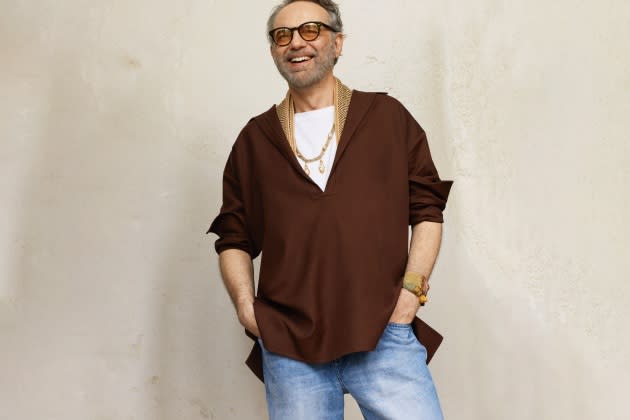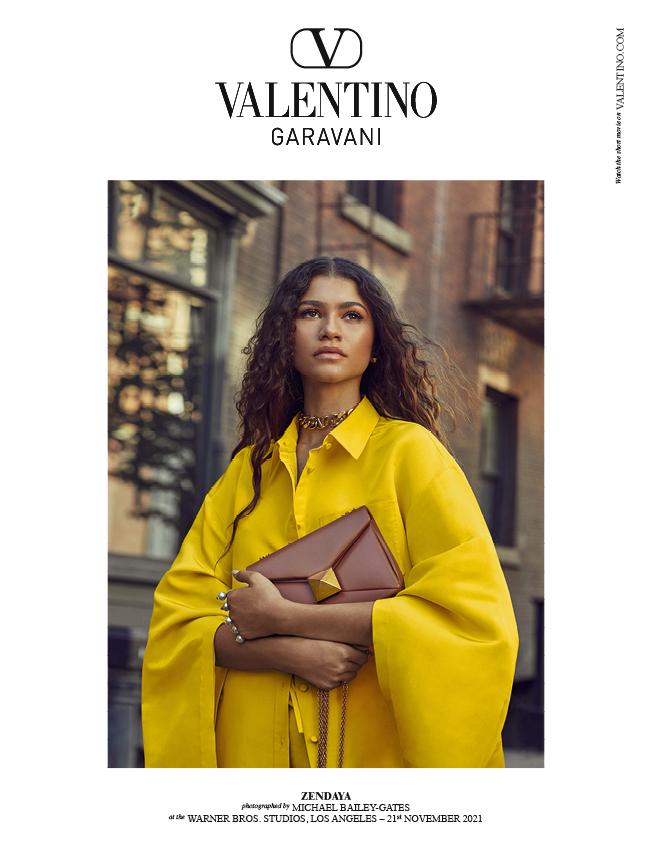Valentino Returns to Profit, Pre-pandemic Sales Levels in 2021

MILAN — 2021 was a key year for Valentino, as chief executive officer Jacopo Venturini carried out the repositioning of the brand, further elevating its couture status and returning the company to the black and to 2019 sales levels.
“I always thought Valentino is legitimately a maison de couture,” said Venturini during an interview at the brand’s Milan offices, despite the fact that the repositioning involved making choices that would also take a bite out of the top line, such as the phasing out of the Valentino Red collection. As reported, the line will be phased out and terminated beginning in 2024. “This means giving up on 90 million euros, but it was a necessary decision,” he explained.
More from WWD
Another important step was to streamline the company’s wholesale accounts and reduce markdowns.
Despite the latter decisions and the impact of the pandemic, in the 12 months ended Dec. 31 revenues rose 39.6 percent to 1.23 billion euros, compared with 882 million euros in 2020. At constant exchange, sales climbed 41 percent on 2020 and 3 percent on 2019.
In the fourth quarter of last year, sales grew 11 percent at constant exchange compared to the same period in 2019, and retail sales climbed 29 percent, driven by full-price sales, balancing the contraction of markdowns.
December was the highest-performing month in the history of the company, also driven by full-price sales, a personalized concierge service on- and off-line and a gifting and Party Christmas capsule collection. Venturini highlighted the growth of fashion jewelry and belts and said capsules have been attracting new customers. Millennials and Gen Z account for 65 percent of Valentino’s customers.
The Rome-based company swung to profit compared with 2020, when it reported a net loss of 127 million euros, but full-year figures are preliminary, need to be approved by the board and could not be disclosed yet.
In 2021, retail sales were up two percentage points to represent 57 percent of total revenues compared with the previous year and Venturini is aiming for this channel to account for 70 percent of sales by 2024 or 2025.
“Shifting our focus on retail means we are changing the motor of the company and also shining a spotlight on human resources, putting the human factor and creativity at the center,” he observed, viewing the group’s salespeople as “ambassadors of the brand, who make a difference” in the organization.
Accordingly, the company has been staging training courses on empathy and personal relations, in “fueling passion” for the profession, offering “opportunities and alternative career paths depending on the individuals to emphasize their specific talents” within the stores, always in a client-centric strategy. “We offer more flexibility to the ambassadors so that their schedules are more in tune with those of the customers and we’ve replaced the idea of a department manager with the team manager so that the same person can assist a customer whatever the category,” said Venturini. The process has started in 70 stores and will be rolled out globally.
“This is a way of thinking, a message and a sense of belonging that will reach the customer in a natural way,” contended Venturini. “Luxury has seen an exponential growth for the past 10, 15 years, but retail has not necessarily paid attention to these elements. [Fashion luxury brands] don’t merely satisfy a need, we spark desire. The interaction with the client adviser must be magical and in sync with the expectations in the value chain to avoid it being dystonic.”
Wholesale sales in 2021 represented 41 percent of the total, down from 44 percent in 2020, in sync with Venturini’s strategy, but he said the channel remains important as a sounding board — “fundamental to grow and challenge oneself with someone that has an expansive vision of the business, although we are choosing partners that believe in our repositioning.”
E-commerce grew at a double-digit pace compared with 2020 and a triple-digit pace compared with 2019. It accounted for 16 percent of retail sales in 2021 compared with 5 percent in 2019.
Valentino has been internalizing its e-commerce, which was previously managed by the Yoox Net-a-porter Group, starting in mid-February by a launch in Japan. In May, it will reach the U.S., followed by Europe. “It will allow us to be client-oriented and truly omnichannel,” said Venturini, as well as more entertaining. Valentino has been exploring “moments of evasion” online and on different social media platforms, offering performances by Alicia Keys or asking a group of authors and poets to create text-only image campaigns involving the likes of Donna Tartt or Ocean Vuong.

Michael Bailey Gates -courtesy of Valentino
Ready-to-wear last year represented 32 percent of sales and accessories accounted for 66 percent of the total. “We worked a lot on our pillars in the past year and a half, launched the Roman Stud, supersizing the studs. We worked on the logo, blending the logo and the stud,” noted Venturini, adding that a stud closure is so highly crafted that it takes nine hours to complete it.
The company has been raising the positioning of the bags, retailing at between 2,000 euros and 3,000 euros, but is adding some entry price points.
The Rockstud shoe has become “super iconic” over the past 10 years, said Venturini, adding that 70 percent of new customers approach the brand for this item.
Furthering its sustainability efforts, two of the brand’s signature sneakers, the Open and the Rockstud Untitled, were redesigned with the environment as a priority, partially involving recycled and bio-based materials, the latter employed as an alternative to leather produced from viscose and polyurethane of corn-derived polyols. These materials partially make the upper material of both models and part of the Open’s side band; the strings are completely made of recycled polyester, while Valentino’s signature studs on the Rockstud Untitled are also made of recycled nylon.
The environmental approach was reflected in the shoe case and the packaging, made of fully recycled cotton and paper, sourced from sustainably managed forests.
Asked about potential price hikes, Venturini said given the higher costs of raw materials and energy, the company has raised its prices by 5 percent in 2022 so far.
As reported, following Russia’s invasion of Ukraine, Valentino has blocked all shipments to Russia, a country that represented 3 percent of sales, although in 2019 Russian tourists shopping around the world accounted for 9 percent of sales. Venturini emphasized creative director Pierpaolo Piccioli’s and his own focus on sustainability and “giving back,” saying that in addition to the company’s donation of 500,000 euros to UNHCR, it is also facilitating the assistance of Ukrainian people who work with the company and their relatives.
By geographies, last year Europe represented 42 percent of sales, the U.S. accounted for 22 percent of revenues and the Middle East for 8 percent of the total.
Greater China and the Far East offer “great potential,” said the executive, and Valentino opened six stores in Korea last year. In the fourth quarter of 2022, three stores will open in China, including a new unit in Shenzen and an expansion in Chengdu.
Boutiques in Geneva and Venice will open in 2023.
A new store concept will be unveiled in Jeddah in September, designed internally. Venturini was especially pleased by the idea of this in-house creativity, which he believes telegraphs “authenticity, recreating our home, and is consistent with our values.” He also said it will allow the company to be “faster and more agile.”
Valentino will also expand and renovate its stores in resort locations, such as Mykonos and Capri, each with a distinctive feel. For example, in Porto Cervo, furniture will be created by a pool of local Sardinian designers.
In 2022, the company is planning a total of 21 openings, six of which are new concessions with Neiman Marcus and Saks.
The investments point to “a shareholder that is very supportive of our strategy,” said Venturini of Mayhoola, the Qatar-based fund that controls the brand.
Another strong supporter is L’Oréal, the brand’s beauty and fragrance licensee, “which really believes in Valentino’s legitimacy in the sector and has been investing a lot in the category.” That business grew 97 percent in 2021 on 2020, doubling the forecasts of the entire year.
Venturini pointed to the strong performance of the “Born in Rome” fragrance, and the launch of the cosmetics line, which also helped drive visibility.
Sign up for WWD's Newsletter. For the latest news, follow us on Twitter, Facebook, and Instagram.

